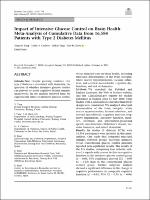Impact of Intensive Glucose Control on Brain Health: Meta-Analysis of Cumulative Data from 16,584 Patients with Type 2 Diabetes Mellitus
Date
2021-03Permanent link
https://hdl.handle.net/11351/7145DOI
10.1007/s13300-021-01009-x
ISSN
1869-6961
WOS
000615533100001
PMID
33548021
Abstract
Introduction
Despite growing evidence that type 2 diabetes is associated with dementia, the question of whether intensive glucose control can prevent or arrest cognitive decline remains unanswered. In the analysis reported here, we explored the effect of intensive glucose control versus standard care on brain health, including structural abnormalities of the brain (atrophy, white matter hyperintensities, lacunar infarction, and cerebral microbleeds), cognitive dysfunction, and risk of dementia.
Methods
We searched the PubMed and Embase databases, the Web of Science website, and the Clinicaltrial.gov registry for studies published in English prior to July 2020. Only studies with a randomized controlled trial (RCT) design were considered. We analyzed structural abnormalities of the brain (atrophy, white matter hyperintensities, lacunar infarction, and cerebral microbleeds), cognitive function (cognitive impairment, executive function, memory, attention, and information-processing speed), and dementia (Alzheimer’s disease, vascular dementia, and mixed dementia).
Results
Six studies (5 different RCTs) with 16,584 participants were included in this meta-analysis. One study that compared structural changes between groups receiving intensive versus conventional glucose control measures reported non-significant results. The results of the five studies, comprising four cohorts, indicated a significantly poorer decline in cognitive function in the intensive glucose control group (β − 0.03, 95% confidence interval [CI] − 0.05 to − 0.02) than in the conventional glucose control group. Further subgroup analysis showed a significant difference in the change in cognitive performance in composite cognitive function (β − 0.03, 95% CI − 0.05 to − 0.01) and memory (β − 0.13, 95% CI − 0.25 to − 0.02). One trial evaluated the prevalence of cognitive impairment and dementia between groups receiving intensive and conventional glucose control, respectively, and the differences were insignificant.
Conclusion
This meta-analysis suggests that intensive glucose control in patients with type 2 diabetes can slow down cognitive decline, especially the decline in composite cognition and memory function. However, further studies are necessary to confirm the impact of strict glucose control on structural abnormalities in the brain and the risk of dementia.
Keywords
Brain health; Diabetes; Intensive glucose controlBibliographic citation
Tang X, Cardoso MA, Yang J, Zhou JB, Simó R. Impact of Intensive Glucose Control on Brain Health: Meta-Analysis of Cumulative Data from 16,584 Patients with Type 2 Diabetes Mellitus. Diabetes Ther. 2021 Mar;12:765–79.
Audience
Professionals
This item appears in following collections
- HVH - Articles científics [4471]
- VHIR - Articles científics [1751]
The following license files are associated with this item:

 Private area
Private area Contact Us
Contact Us








